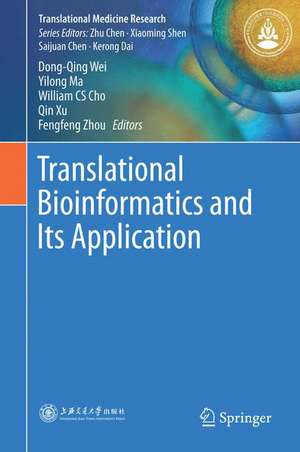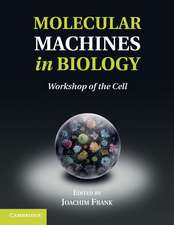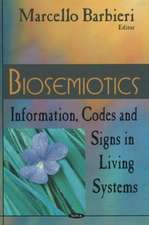Translational Bioinformatics and Its Application: Translational Medicine Research
Editat de Dong-Qing Wei, Yilong Ma, William C.S. Cho, Qin Xu, Fengfeng Zhouen Limba Engleză Hardback – 10 apr 2017
| Toate formatele și edițiile | Preț | Express |
|---|---|---|
| Paperback (1) | 1002.96 lei 38-44 zile | |
| SPRINGER NETHERLANDS – 25 iul 2018 | 1002.96 lei 38-44 zile | |
| Hardback (1) | 1178.37 lei 3-5 săpt. | |
| SPRINGER NETHERLANDS – 10 apr 2017 | 1178.37 lei 3-5 săpt. |
Preț: 1178.37 lei
Preț vechi: 1472.96 lei
-20% Nou
Puncte Express: 1768
Preț estimativ în valută:
225.48€ • 236.05$ • 186.57£
225.48€ • 236.05$ • 186.57£
Carte disponibilă
Livrare economică 15-29 martie
Preluare comenzi: 021 569.72.76
Specificații
ISBN-13: 9789402410433
ISBN-10: 9402410430
Pagini: 466
Ilustrații: VIII, 437 p. 85 illus., 59 illus. in color.
Dimensiuni: 155 x 235 x 29 mm
Greutate: 0.98 kg
Ediția:1st ed. 2017
Editura: SPRINGER NETHERLANDS
Colecția Springer
Seria Translational Medicine Research
Locul publicării:Dordrecht, Netherlands
ISBN-10: 9402410430
Pagini: 466
Ilustrații: VIII, 437 p. 85 illus., 59 illus. in color.
Dimensiuni: 155 x 235 x 29 mm
Greutate: 0.98 kg
Ediția:1st ed. 2017
Editura: SPRINGER NETHERLANDS
Colecția Springer
Seria Translational Medicine Research
Locul publicării:Dordrecht, Netherlands
Cuprins
Drug Discovery.- Translational Bioinformatics and Drug Discovery.- Translational Research in Drug Discovery and Development.- Exploring the Potential of Herbal Ligands towards Multidrug Resistant Bacterial Pathogens by Computational Drug Discovery.- The Progress of New Targets of Anti-HIV and Its Inhibitors.- Exploration of Drug Candidates Interacting on Amyloid-β Protofibrils for Alzheimer’s Disease.- Homology Modeling, Structure Based Pharmacophore Modeling, High Throughput Virtual Screening and Docking Studies of L-Type Calcium Channel for Cadmium Toxicity.- Natural Compounds Are Smart Player in Context to Anticancer Potential: An In Silico and In Vitro Advancement.- Genome Wide Association Studies.- A Survey of Bioinformatics Based Tools in RNA-Sequencing (RNA-Seq) Data Analysis.- Epigenetics and Its Role in Human Cancer.- Methods for Microbiome Analysis.- Pharmacogenomics: Clinical Perspective, Strategies and Challenges.- Computational Network Approaches and Their Applications forComplex Diseases.- Bioinformatics Applications in Clinical Microbiology.- Artificial Intelligence and Automatic Image Interpretation in Modern Medicine.- Computation in Medicine: Medical Image Analysis and Visualization.
Recenzii
“This translational bioinformatics book addresses the drug discovery process, selected aspects of precision medicine, and analytics and modeling approaches with examples. … It appears to be of primary interest to graduate students in bioinformatics–related areas and to established researchers in related fields looking for an overview of current approaches with examples.” (David M. Liebovitz, Doody's Book Reviews, July, 2017)
Notă biografică
Dongqing Wei is a professor at the State Key Laboratory of Microbial Metabolism and acting head of Department of Bioinformatics and Biostatistics, College of Life Science and Biotechnology, Shanghai Jiao Tong University. He also serves as the editor-in-chief for the journal “Interdisciplinary Sciences – Computational Life Sciences” and on the editorial board of several journals, such as the Journal of Molecular Graphics and Modeling, the Journal of Biomedical Science and Engineering and the International Journal of Biomedical Engineering and Consumer Health Informatics. His research interests focus on structural bioinformatics and biophysics, and he has published more than 150 research articles in leading journals.
Yilong Ma is an associate investigator at the Feinstein Institute for Medical Research. He is also core leader (PET) of the Imaging Core at the Feinstein Institute’s Halth Morris K. Udall Center of Excellence for Parkinson's Disease Research. Dr. Ma specializes inthe development and application of innovative brain imaging methodology for mechanistic studies of neurodegenerative diseases. He has published over 80 peer-reviewed articles and book chapters on patient-oriented translational research in neurodegenerative and neuropsychiatric disorders.
William CS Cho is a scientific officer at the Department of Clinical Oncology at Queen Elizabeth Hospital. He serves as the editor-in-chief, editor and associate editor of a number of international medical journals, such as Translational Genetics and Genomics and Clinical Medicine Insights: Oncology. His research focuses on molecular oncology, tumor marker discovery and bioinformatics, and he has published more than 200 articles in these fields.
Qin Xu is an associate investigator at the College of Life Sciences and Biotechnology, Shanghai Jiao Tong University. His research focuses on computational structural biology. Dr. Xu has published more than 20 research articles in this field.
Fengfeng Zhou is a professor at the College of Computer Science and Technology, Jilin University. He serves as the associate editor for the journal Frontiers in Bioinformatics and Computational Biology, and is a board member for a number of other international journals. His research focuses on computational characterization of genome variations and biomarkers for mammalian genetic diseases. He has published more than 40 research articles in these fields.
Yilong Ma is an associate investigator at the Feinstein Institute for Medical Research. He is also core leader (PET) of the Imaging Core at the Feinstein Institute’s Halth Morris K. Udall Center of Excellence for Parkinson's Disease Research. Dr. Ma specializes inthe development and application of innovative brain imaging methodology for mechanistic studies of neurodegenerative diseases. He has published over 80 peer-reviewed articles and book chapters on patient-oriented translational research in neurodegenerative and neuropsychiatric disorders.
William CS Cho is a scientific officer at the Department of Clinical Oncology at Queen Elizabeth Hospital. He serves as the editor-in-chief, editor and associate editor of a number of international medical journals, such as Translational Genetics and Genomics and Clinical Medicine Insights: Oncology. His research focuses on molecular oncology, tumor marker discovery and bioinformatics, and he has published more than 200 articles in these fields.
Qin Xu is an associate investigator at the College of Life Sciences and Biotechnology, Shanghai Jiao Tong University. His research focuses on computational structural biology. Dr. Xu has published more than 20 research articles in this field.
Fengfeng Zhou is a professor at the College of Computer Science and Technology, Jilin University. He serves as the associate editor for the journal Frontiers in Bioinformatics and Computational Biology, and is a board member for a number of other international journals. His research focuses on computational characterization of genome variations and biomarkers for mammalian genetic diseases. He has published more than 40 research articles in these fields.
Textul de pe ultima copertă
This book offers a detailed overview of translational bioinformatics together with real-case applications. Translational bioinformatics integrates the areas of basic bioinformatics, clinical informatics, statistical genetics and informatics in order to further our understanding of the molecular basis of diseases. By analyzing voluminous amounts of molecular and clinical data, it also provides clinical information, which can then be applied. Filling the gap between clinic research and informatics, the book is a valuable resource for human geneticists, clinicians, health educators and policy makers, as well as graduate students majoring in biology, biostatistics, and bioinformatics.
Caracteristici
Summarizing the cutting-edge research development and methodology in disease-related bioinformatics Valuable for a wide realm of readers including graduate students, researchers and clinicians Written by experts in the field of bioinformatics Supplied with ample illustrations?











